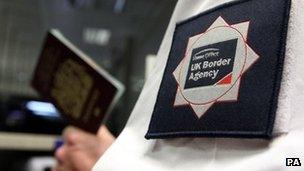Civil servants 'to staff borders' during strikes
- Published

Thousands of border staff are expected to walk out in protest at changes to their pensions
Civil servants from across Whitehall are being lined up to act as border staff at UK ports and airports during next week's public sector strikes.
Thousands of border agency workers are expected to strike on 30 November in protest at government pension changes.
Ministers fear there could be major disruption for travellers, so volunteers are being asked to step in.
PCS Union chief Mark Serwotka said ministers were in a "blind panic" and should be resolving the dispute.
The UK Border Agency has insisted the civil servants will be properly trained.
It is expected they would mainly check the passports of travellers arriving from the European Economic Area and man so-called "e-gates" where passengers use their biometric passports.
'Desperation'
A UKBA spokesman said: "The security of the UK border remains our top priority and it is absolutely right we explore all options to ensure we minimise any disruption caused by planned union action."
Union leader Mark Serwotka says the government is "panicking at the 11th hour putting untrained people on the front line"
However, union chiefs expressed concern that the officials might not be properly trained and that borders could be put at risk.
Mr Serwotka, general secretary of the Public and Commercial Services Union, blamed ministers for leaving it so late to try and resolve the dispute.
He told BBC Radio 4's Today programme that the call to civil servants was an example of "blind panic" at the 11th hour, he said, and accused the government of engaging in a misleading "PR exercise" about public sector pensions to try to force through "damaging" changes.
"Instead of scratching around trying to put untrained people on the front line, they should say today they want urgent talks to try to resolve the dispute," he said.
The government has confirmed earlier reports that UKBA is planning to fly some officials home from overseas positions to help deal with the strike.
In the wake of the recent row between Home Secretary Theresa May and former UK border force chief Brodie Clark over the relaxation of controls during the summer, it is extremely unlikely that officials would be prepared to bypass any rules to ease the pressure of queues.
Pension negotiations
The BBC has also learned that the government has told union bosses that they are not prepared to offer any further concessions over pension reforms as a result of the planned strikes.
The government recently made what it describes as an improved offer to the unions, promising that public sector workers ten years away from retirement would not see any change to their pensions. It also promised improved accrual rates.
Ministers fear that any further concessions would send the wrong signal to financial markets by suggesting that the government was not serious about cutting the deficit and making substantial savings in the public sector pension bill.
Ministers argue that public sector pensions have become unaffordable because of rising life expectancy, but they insist that even after the planned changes, state employees will still be better off than the majority of workers in the private sector.
Unions say their members are being asked to work longer, contribute more and receive less.
- Published23 November 2011
- Published17 November 2011